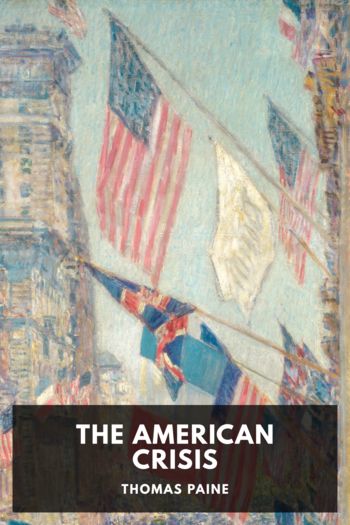Fateful Lightning: A New History of the Civil War & Reconstruction, Allen Guelzo [best thriller novels of all time txt] 📗

- Author: Allen Guelzo
Book online «Fateful Lightning: A New History of the Civil War & Reconstruction, Allen Guelzo [best thriller novels of all time txt] 📗». Author Allen Guelzo
The controversy over Kansas-Nebraska finished off what little fellow feeling remained between Northern and Southern Whigs, and most of the Northern Whigs wandered off to experiment with a series of short-lived anti-Nebraska “fusion” coalitions or bitter-end anti-immigrant hate groups such as the American Party (or “Know-Nothings,” a name they earned from their pledge to respond, when questioned about their political loyalties, “I know nothing”). Although some of the most prominent Whigs, such as William Henry Seward of New York, openly spurned the Know-Nothings and curried the political favor of the immigrant population, other Whigs found the Know-Nothing hatred for foreigners and immigrants a perfectly congenial match to their own brand of nationalism. “Every intelligent man knows full well that our country has suffered much from the too-great indulgence of foreigners, ignorant of our institutions & that their power for evil ought to be abridged,” grumbled the Ohio Whig senator “Bluff Ben” Wade.
The Know-Nothings were poorly organized to function as a national political party, and their opinions were fatally divided over the slavery issue. Eventually both nativist Whigs and anti-slavery Know-Nothings would be compelled to find their way to a new free-soil party where Know-Nothing nativism could be tempered by the more moderate strains of Whig nationalism and both absorbed into the more volatile issue of slavery. It did not take long for such a new party to emerge. In May 1854 a group of thirty Northern ex-Whig and anti-Nebraska Democratic congressmen met in Washington to issue a call for a new party that would unite all the “fusion” and anti-Nebraska groups, and in July a state convention in Jackson, Michigan, nominated the first slate of candidates to run under the banner of the new Republican Party.54
The core of the new party was the remnants of what had once been the mainstream Northern Whigs—Seward of New York, Charles Sumner and Henry Wilson of Massachusetts, Zachariah Chandler of Michigan. Like the old Whigs, the new Republicans saw themselves as the party of an enterprising white middle class whose prosperity depended on keeping the American economy dynamic and market-oriented. “The interests of the country and its wealth are wrapped up in property in a very great degree,” said William Pitt Fessenden, who quietly parted from the Whigs for the Republicans in 1856. It was simply a matter of the common good that “men should be incited in every way to accumulate,”
because as much as they accumulate by their industry they add to the national wealth … and the prosperity of our country in a very great part is owing to the fact that our institutions leave the path of wealth, as of honor, open to all men, and encourage all men, whatever may be their situations in life, however they may start, to better their condition and to accumulate wealth, because the more they accumulate it the more the nation has of wealth.55
They resented the overly mighty power of Southern planters and Southern Democrats in Washington, believing that Democratic opposition to banks, tariffs, and “internal improvements” was little more than a strategy to starve Northern industry. They also opposed Southern plans to expand slavery into the western territories because the plantation system would discourage small-scale entrepreneurs and commercial farmers from taking the risks of competition with slave agriculture. They also had one more fear: should the territories be closed off to free settlement, the “mechanics” who tended Northern factories would clog Northern cities and become a permanent—and dangerous—urban underclass who owned no property of their own and who had no real hope of access to it. So, in addition to the old project of Henry Clay’s “American System,” Republicans proposed to head off the problem of working-class poverty and the class conflict Leonidas Spratt had prophesied in 1855 by selling off public lands in the territories as homesteads at cheap prices, so that even the poorest urban worker could, after diligent working and saving, hope to find new life and new economic opportunity beyond the Mississippi. Governmental power would thus come to the rescue of liberty.56
This, of course, is what frightened the Republicans about Kansas-Nebraska. Mobility, development, and economic self-transformation were entirely absent from the slave South, they argued; slaves had no real liberty to become anything other than a slave, and the great slave moguls used the bogeyman of race and the provision of cheap, nontaxed imports to buy off the potential resentments of nonslaveholding whites and keep them in a state of permanent dependence. Now Douglas and the Democrats seemed bent upon using popular sovereignty as a cheap trick to open the territories to slavery and turn off the safety valve of opportunity that would eliminate conflict in Northern industry. For the Republicans, slavery was no longer an economic system but a deadly conspiracy, a conscious “Slave Power” that had possessed the soul of the Democratic Party and was determined to seize the territories and turn them into nurseries for slavery.57
The Republicans were not the first to accuse the South of hatching a “Slave Power” conspiracy. Salmon Chase claimed in 1854 that the entire Kansas-Nebraska bill was “part and parcel of an atrocious plot” to create in the territories “a dreary region of despotism, inhabited by masters and slaves.” No one made better use of the accusation than the Republicans, and in short order the Republicans attracted Chase and the most anti-slavery of the Northern Democrats to their banner. Whatever the ethnic and cultural baggage carried into the new party from the nativists among the old Whigs or from the various cranky





Comments (0)